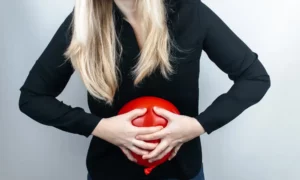Entering the phase of perimenopause is akin to setting sail on a new journey, marked by hormonal shifts and a variety of symptoms. One prevalent issue that many women face during this transitional period is bloating. In this article, we’ll explore the complexities of perimenopause bloating and effective remedies to navigate through this challenging time.
Contents
What Is Perimenopause Bloating? 
Perimenopause bloating refers to the sensation of abdominal fullness, tightness, or swelling that some women experience during the perimenopausal phase. Bloating is a common symptom and can be attributed to hormonal changes, particularly fluctuations in estrogen levels.
Bloating during menopause commonly arises from the retention of water or gas in the gastrointestinal tract. This discomfort involves a sensation of pressure in the abdominal region caused by an excess of air or fluid. It may be perceived as a feeling of fullness or tightness.
Occasionally, bloating can lead to noticeable swelling of the stomach, and individuals may undergo temporary weight gain as a result of this bloating.
Causes:
Bloating can have various causes, and identifying them can help in managing and preventing discomfort. Common causes of bloating include:
- Gas Buildup
Swallowing air while eating or drinking.
Bacterial fermentation of undigested food in the colon.
- Dietary Factors
Consuming gas-producing foods, such as beans, lentils, broccoli, cabbage, and carbonated drinks.
Eating too quickly or overeating.
- Food Intolerances
Intolerance to certain carbohydrates like lactose or fructose.
- Constipation
Slowed or irregular bowel movements can cause a buildup of gas and bloating.
- Gastrointestinal Disorders
Irritable Bowel Syndrome (IBS) can lead to abdominal discomfort and bloating.
Inflammatory bowel diseases like Crohn’s disease or ulcerative colitis.
- Hormonal Changes
Menstrual cycle-related bloating in women.
Hormonal fluctuations during perimenopause or menopause.
- Fluid Retention
Certain medical conditions, like kidney or heart problems, can cause fluid retention and bloating.
- Overgrowth of Bacteria in the Small Intestine (SIBO)
Excessive bacteria in the small intestine can lead to bloating and digestive issues.
- Medications
Some medications, such as antibiotics, can disrupt the balance of gut bacteria and cause bloating.
- Functional Gastrointestinal Disorders
Conditions like functional dyspepsia or functional bloating may not have an obvious cause but lead to persistent discomfort.
Symptoms Of Perimenopause Bloating
Perimenopause bloating can manifest with various symptoms, contributing to a sense of abdominal discomfort and fullness. Common symptoms associated with perimenopausal bloating include:
- Abdominal Discomfort
A general feeling of discomfort or pressure in the abdominal area.
- The feeling of Fullness
The sensation of being full, even after consuming small amounts of food. - Abdominal Swelling
Noticeable swelling or distension of the stomach region. - Gas and Flatulence
Increased gas production, leading to burping or passing gas. - Temporary Weight Gain
Fluctuations in weight due to water retention associated with bloating. - Changes in Bowel Habits
Irregular bowel movements, constipation, or alternating between constipation and diarrhea. - Gastrointestinal Discomfort
Discomfort or pain in the digestive tract, often in the form of cramping. - Clothing Tightness
The sensation that clothing, particularly around the waist, feels tighter than usual. - Increased Belching
Frequent belching, which can be a result of swallowed air during eating. - Disturbed Sleep
Disruption in sleep patterns due to discomfort or bloating-related symptoms. - Mood Changes
Emotional changes, including irritability or frustration, may be linked to physical discomfort.
It’s important to note that perimenopausal bloating may vary in intensity and duration among individuals. These symptoms can be transient or persistent, and their impact on daily life can differ.
Natural Remedies For Perimenopause Bloating 
Natural remedies can be effective in managing perimenopause bloating. Here are some options to consider:
Dietary Adjustments
- Limit Gas-Producing Foods: Reduce intake of gas-producing foods like beans, broccoli, cabbage, and carbonated drinks.
- Manage Portion Sizes: Eating smaller, more frequent meals can help prevent overeating and reduce bloating.
- Hydrate Adequately: Drinking plenty of water can prevent dehydration and help maintain fluid balance.
Herbal Teas
- Peppermint Tea: Known for its soothing properties, peppermint tea may help alleviate bloating and promote digestion.
- Ginger Tea: Ginger has anti-inflammatory properties and can aid in reducing gastrointestinal discomfort.
Probiotics
- Fermented Foods: Incorporate probiotic-rich foods like yogurt, kefir, sauerkraut, and kimchi to promote a healthy balance of gut bacteria.
Digestive Enzymes
- Supplements: Consider digestive enzyme supplements to assist in the breakdown of food and improve digestion.
Regular Exercise
- Aerobic Exercise: Engaging in regular aerobic activities can stimulate digestion and reduce bloating.
- Yoga: Practicing yoga can help with relaxation, and stress management, and alleviate digestive discomfort.
Stress Reduction
- Mindfulness and Meditation: Techniques that promote relaxation can help manage stress and its impact on digestive function.
- Deep Breathing: Incorporate deep breathing exercises to relax the abdominal muscles and reduce tension.
Avoiding Trigger Foods
- Identify and Avoid Triggers: Pay attention to specific foods that seem to worsen bloating and consider avoiding them.
Hydration with Herbal Infusions
- Dandelion Tea: Dandelion tea is a natural diuretic that may help reduce water retention and bloating.
Heat Therapy
- Warm Compress or Heating Pad: Applying heat to the abdominal area can help relax muscles and relieve bloating.
Adequate Fiber Intake
- Whole Foods: Include fiber-rich whole foods, such as fruits, vegetables, and whole grains, to support digestive health.
Maintain a Food Diary
- Track Symptoms: Keeping a food diary can help identify specific triggers and patterns related to bloating.
It’s important to note that individual responses to natural remedies may vary, and it’s advisable to consult with a healthcare professional before making significant changes.
Herbal Remedies And Supplements For Perimenopause Bloating
Certain herbal remedies and supplements may offer relief from perimenopause bloating. However, it’s essential to consult with a healthcare professional before incorporating these options, as they may interact with medications or have varying effects on different individuals. Here are some herbal remedies and supplements to consider:
Black Cohosh
- Usage: Black cohosh is often used to alleviate various perimenopausal symptoms, including bloating.
- Caution: It’s essential to use black cohosh under the guidance of a healthcare provider, as its safety for long-term use is still under study.
Dandelion Root
- Usage: Dandelion root is believed to have diuretic properties, potentially reducing water retention and bloating.
- Caution: Individuals with allergies to ragweed or related plants may also be allergic to dandelion.
Peppermint Oil
- Usage: Peppermint oil capsules may help relieve symptoms of irritable bowel syndrome (IBS), including bloating.
- Caution: Peppermint oil can cause heartburn in some individuals, and it should be used in enteric-coated capsules to prevent irritation.
Ginger
- Usage: Ginger may have anti-inflammatory properties and can be consumed as tea or in supplement form to ease digestive discomfort.
- Caution: Individuals taking blood-thinning medications should consult their healthcare provider before using ginger supplements.
Fennel Seed
- Usage: Fennel seeds are traditionally used to ease digestive issues, including bloating and gas.
- Caution: Individuals with allergies to celery, carrots, or mugwort may also be allergic to fennel.
Probiotics
- Usage: Probiotic supplements can promote a healthy balance of gut bacteria, potentially reducing digestive symptoms.
- Caution: Choose a reputable brand, and consult with a healthcare provider to determine the most suitable strain and dosage.
Chamomile
- Usage: Chamomile tea may have calming effects on the digestive system, reducing bloating and discomfort.
- Caution: Individuals allergic to ragweed or related plants may also be allergic to chamomile.
Activated Charcoal
- Usage: Activated charcoal supplements may help absorb excess gas in the digestive system, reducing bloating.
- Caution: It’s essential to take charcoal supplements away from medications, as they can interfere with absorption.
DGL (Deglycyrrhizinated Licorice)
- Usage: DGL can be used to soothe the digestive tract and may help alleviate bloating.
- Caution: Individuals with hypertension should use DGL, as regular licorice can affect blood pressure.
Before trying any herbal remedy or supplement for perimenopause bloating, it’s crucial to discuss your symptoms, health history, and potential interactions with a healthcare provider. They can provide personalized advice and ensure that the chosen remedies are safe and suitable for your individual needs.
Conclusion
In conclusion, managing perimenopause bloating requires a multifaceted approach. By adopting natural remedies, making lifestyle adjustments, and seeking professional advice, women can navigate this transitional phase with grace and resilience.
If you are facing menopause related issues, menopause treatment at HerMantra can help. Book your free trial online menopause treatment session now.




